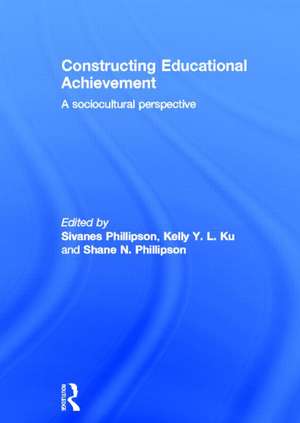Constructing Educational Achievement: A sociocultural perspective
Editat de Sivanes Phillipson, Kelly Ku, Shane Phillipsonen Limba Engleză Hardback – 11 mar 2013
The book brings together eminent scholars from early childhood, primary education, secondary and vocational education who expertly capture the vitality of development and processes of specific child factors and their interaction with their environment that explain their school achievement. Foregrounded in the five planes of cultural historical, institutional, social, personal and mental, the research explain how children think, learn and form the will to perform amidst the changing social and family environment, and challenging school and educational environment.
Preț: 991.17 lei
Preț vechi: 1331.35 lei
-26% Nou
Puncte Express: 1487
Preț estimativ în valută:
189.66€ • 198.52$ • 157.86£
189.66€ • 198.52$ • 157.86£
Carte tipărită la comandă
Livrare economică 31 martie-14 aprilie
Preluare comenzi: 021 569.72.76
Specificații
ISBN-13: 9780415517119
ISBN-10: 0415517117
Pagini: 288
Ilustrații: 12 b/w images and 25 tables
Dimensiuni: 174 x 246 mm
Greutate: 0.69 kg
Ediția:New.
Editura: Taylor & Francis
Colecția Routledge
Locul publicării:Oxford, United Kingdom
ISBN-10: 0415517117
Pagini: 288
Ilustrații: 12 b/w images and 25 tables
Dimensiuni: 174 x 246 mm
Greutate: 0.69 kg
Ediția:New.
Editura: Taylor & Francis
Colecția Routledge
Locul publicării:Oxford, United Kingdom
Public țintă
PostgraduateCuprins
Introduction 1. Constructing educational achievement within a sociocultural framework of planes Sivanes Phillipson and Peter D. Renshaw Part 1: Cultural-historical Plane 2. Framing achievement when learning is unified: The concept of unity in Vygotsky’s theory and methodology Jennifer A. Vadeboncoeur 3. Family capital, child’s personal agency, and the academic achievement of Chinese migrant children Qiaobing Wu 4. A psychometric understanding of sociocultural factors in test validity: The development of standardised test materials for Māori medium schools in New Zealand/Aotearoa Peter J. Keegan, Gavin T. L. Brown and John A. C. Hattie Part 2: Institutional Plane 5. Classroom chronotopes privileged by contemporary educational policy: Teaching and learning in testing times Peter D. Renshaw 6. Teacher self efficacy: Internalized understandings of competence Janet Draper Part 3: Social Plane 7. Parental expectations: The influence of the significant other on school achievement Sivanes Phillipson 8. Examining the Relations Between a Play Motive and a Learning Motive for Enhancing School Achievement: Doing ‘School’ at Home Marilyn Fleer 9. Peer co-regulation of learning, emotion, and coping in small-group learning Mary McCaslin and Ruby Inez Vega 10. Teacher-student relationships and students’ learning outcomes Atara Sivan and Dennis W. K. Chan 11. Social learning, language and instruction for adult learners where English is their second language Ian Hay, Rosemary Callingham and Frederick Wright 12. Two instead of one ZPD: Individual and joint construction in the ZPD Aleksander Baucal Part 4: Personal Plane 13. When Lev Vygotsky meets Francis Galton: On the nature and nurture of reading development Simpson W. L.Wong 14. Education for Citizenship: An experiment in leadership development of pupils making the transition from primary to secondary school Jim O'Brien, Evgeniya Plotnikova, and Iain Mills 15. How encouragement in everyday family practices facilitates Hong Kong-Australian children’s motive for learning Pui Ling Wong Part 5: Mental Plane 16. Cognitive style and achievement through a socio-cultural lens: A new way of thinking about style differences Elizabeth R. Peterson and Kane Meissel 17. Role of verbal reasoning in critical thinking Kelly, Y. L. Ku 18. Cognitive perturbation with dynamic modeling: A reconceptualization of conceptual change in science education Sandy C. Li and Jacky W. C. Pow Conclusion 19. The role of culture in constructing educational achievement Sivanes Phillipson and Shane N. Phillipson
Descriere
Using Vygotsky's theory as a conceptual framework to "construct" school achievement, this book puts forth a culturally relevant context for understanding developmental aspects of children’s school achievement and their implication to classroom practice.
